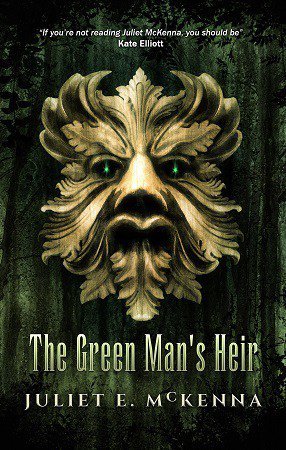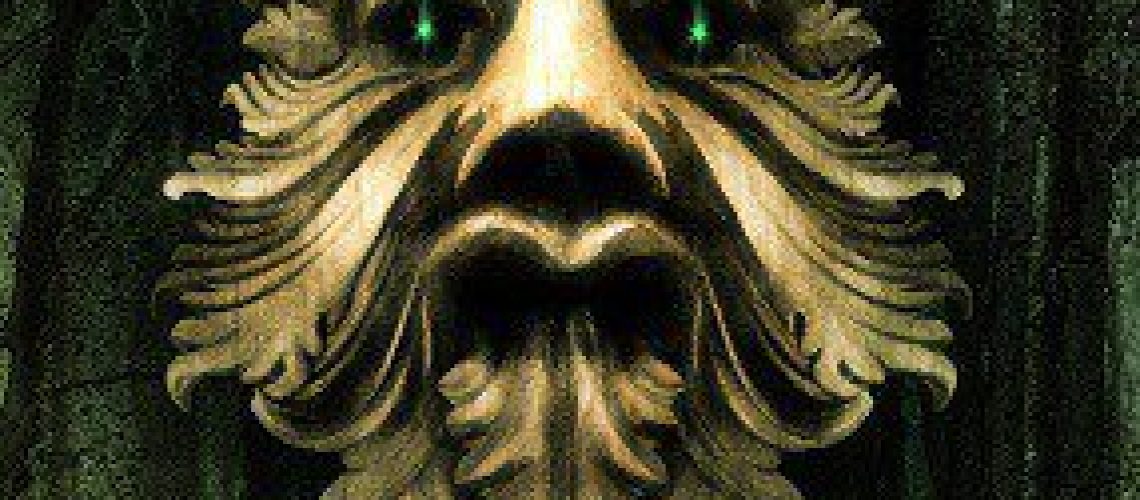The story of Daniel Mackmain, son of a Dryad, inspired by Juliet McKenna’s 2012 story “The Roots of Aston Quercus”, is told in her new novel, The Green Man’s Heir. The Green Man’s Heir combines a strong sense of place with a confident use of rural fantasy to create a strong character and excellent worldbuilding.

Daniel Mackmain lives at Kympton Grange Farm, in the shadow of the White Peak in the scenic Peak District of Northern England. He works as a itinerant carpenter and construction worker, having moved around the British Isles at irregular intervals to do such work. He also makes wood carvings to sell at craft fairs. It’s a low-key life and Daniel lives it in an unobtrusive fashion, until a horrific murder in a nearby wood draws his notice, the notice of the community and the local police. By circumstance and accident, as well as choice, Daniel finds himself wrapped up in the investigation for the killer.
There is an additional wrinkle, however. For, you see, there is a supernatural element to this killing. And moreover, there is a hidden supernatural element to Daniel as well. It will take the son of a Dryad and a mortal man, and certainly with additional help, to solve not only the immediate problem…but the deeper, darker problem lurking and slowly awakening even deeper beneath the surface of the land.
Welcome to Juliet McKenna’s The Green Man’s Heir.
The heart of the excellent plotting of the novel is a trademark of McKenna’s work, a care and craft for consequence, change, choice and a widening scope of the action and the actual problem. It all peels back in layers, as Daniel’s investigation of the local killing uncovers more and more about the local problem. It evolves from a killer, to a more supernatural opponent, and thence to a larger problem still. There are clues and revelations at each stage, as McKenna takes us through the plot, that point to the ever larger gyre of the problem that Daniel faces. It’s an excellently crafted and executed cycle and circle of gears of action and plot.
Daniel is an intriguing character, the center of a community of a widening circle of characters. Son of a mortal man and a dryad, Daniel’s connection to the supernatural is, at the beginning of the novel, something he does not embrace or take advantage of. In point of fact, he tries hard not to break hearts and cause domestic strife because of his preternatural ability to attract women thanks to his heritage. His only other real supernatural ability, as far as he knows, is the ability to see supernatural beings like Dryads (and others which we come across in the course of the novel). So while he does have one foot in the otherworld, Daniel is a very grounded character who is eminently relatable to as just another guy you might see at the pub. His character growth and development really are personality and character driven rather than an upgrade to his abilities. We get to see Daniel from a strict first person point of view, a strong sense of focus of what he’s thinking and feeling that allows us to really do that deep dive, and it’s done very well. I got a full sense of what’d it be like to encounter him on, say, a touristing trip of my own. (I’d totally buy a piece of woodwork from him).
The landscapes and sense of place are really strong in the novel as well. We get, as mentioned above, to see more and more of it as the novel unfolds, as the plot drives Daniel to new locations and new facets of the problem. My personal knowledge and experience of England is limited to the far south of the country. I had not heard of the Peaks district, nor its woods and mountains, before reading this novel. Although most of the locales per se here are strictly fictional, they have a strong sense of realism and are rendered as real places that I enjoyed visiting virtually and would not mind visiting in real life, camera in hand.
The literary similarity to Paul Cornell’s Lychford’s novellas is striking, although they take completely different tacks. There is a sense of “Magic in the English Midlands” landscape, character and place in both Juliet’s new work here and Paul’s novellas that makes me certain that fans of Paul’s stories will find tons to love here in Juliet’s. Rural, small town life intruded and threatened and impinged upon by the malevolent supernatural, with positive supernatural forces to oppose those forces. Those readers of Juliet’s work who haven’t tried the Lychford novellas should definitely take a look at Paul’s work in turn.
The widening circles of plot, character and landscape of the novel are something I took away from strongly as a theme and a template from the novel. It does feel like the start of a series of books and stories involving the character, since rather than widening and then closing, the novel continues its expansion of all three legs of the novel almost until the conclusion of the novel. It does give the novel a bit of a feel of “let’s add more” as it goes on, but it seems to point to an enthusiasm the author has for her work. It’s an infectious quality, too, as I learned more throughout the course of the novel, I was drawn along with the novel to learn more myself, providing yet another impetus to continue reading.the book.
I have mainly enjoyed Juliet McKenna’s secondary world fantasy novels and stories. With The Green Man’s Heir, and the openings and opportunities for further stories of Daniel, I’m certainly on board for reading more such novels.








One Response